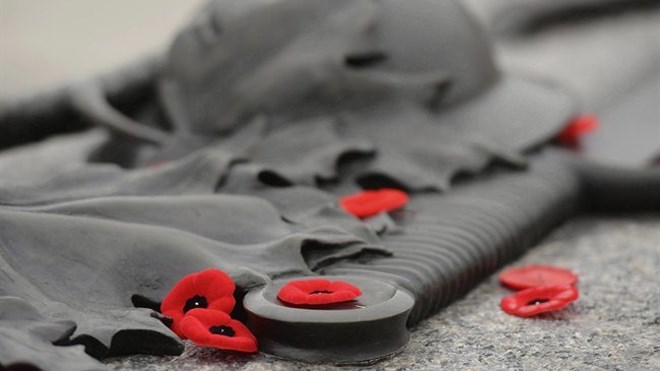My grandfather, my nonno, Francesco Gentili, fought for Benito Mussolini’s fascist government in the Second World War. It wasn’t his choice.
He was captured pretty quickly by the Americans and spent the rest of the war at POW camp in North Africa, in relative safety. He worked as a camp guard.
My father Enrico’s first memory of his father is actually kind of funny. My dad remembers standing with his mother by the road that ran by their farm, just outside the village of Sarnano in the Marche region of Italy.
I didn’t inherit it, but there’s a swarthy streak that runs through the Marchegiani (just take a look at a photo of Ward 2 Coun. Michael Vagnini, who’s also of Marchegian descent and you’ll understand what I mean). After spending so much time in North Africa, Nonno was turned such a deep shade of brown that my father remembers wondering, upon first seeing him, why his father was a black man.
The war so devastated Italy, my father’s family had fled the country by the early 1950s, along with thousands upon thousands of their fellow Italians, for the land of the mangiacake (“mon-ja-cake”, cake-eater, a.k.a. non-Italians).
In 2018, you’re hard-pressed to find direct connections to the two defining moments of the 20th century, the world wars. It’s the 100th anniversary of the 1918 Armistice this year. It’s been 73 years since the end of the Second World War.
Connections are vanishing.
For me, and probably thousands of young people who attended St. Mary’s Separate School in Deep River, Ont., my hometown, our best connection was a woman named Veronica Marr (not to be confused with the mid-2000s teen noir TV show, “Veronica Mars”).
I remember her as a somewhat diminutive, white-haired older woman, and the shortest giant I’d ever met. Mrs. Marr, short and elderly though she was, could command a room like few people I’ve ever seen.
During Nov. 11 services, when she stepped to the altar at Our Lady of Good Counsel church or to the front of the school gym, the crowd of students would fall silent, and Mrs. Marr would begin to speak.
I don’t remember specific stories she told, but standing before us in her Legion uniform, eyes scanning the room, she brushed the dust from the window of history and brought the war to life.
For years, Mrs. Marr (who passed away in 2001 in her 90s) gave thousands of students a gift. She provided a touchstone to a past age, drawing connections from us back through time, showing us how we were in fact linked to our past, that history wasn’t dead, but survived in us.
In my mind, Mrs. Marr, and people like her, did as much to win the wars as did men like Haig and Montgomery and Patton.
My children lack that connection. It’s hard to “remember the sacrifice” when anyone who could act as a living monument to either world war has passed on. Scholarly historical works and popular entertainment are important and useful, but we’re losing, or have lost, the storytellers.
And that’s a real tragedy, because there are lessons still to be learned from the world wars. We live in an age of polarization, an age where the political centre is being hollowed out as people are pulled increasingly to the left or right. It’s an age of rising xenophobia, of street fights between opposing political factions, an age where controversial views are de-platformed instead of being dragged into the light to be dismantled.
It’s an age where strength is becoming prized over rationality, and strong leaders who label the free press enemies of the people and stoke fears that immigrants are an amorphous force, hiding rapists and drug-dealers and terrorists, are winning elections. It’s an age in which The Other is a potential source of danger.
It’s an age where more and more wealth is controlled by fewer and fewer elites, and social safety nets are seen as undeserved handouts.
Remembering the sacrifice isn’t about preserving the stories so much, as it is about understanding the connections and the context. It’s about seeing history as a through-line, not a series of independent events, but a continuum where the conditions of yesterday create the reality of today.
The loss of this connection is to our detriment. For the younger generations, who inherit their today from our yesterday, phrases like “Lest we forget” are just words, a thing to recite without being able to contextualize what it means or signifies.
It’s more than just sad; it’s could be catastrophic. The world wars aren’t done with us, even if we think we’re done with them. There are lessons we have failed to learn, and lessons we’ve failed to pass on.
That is why it is so important to honour Remembrance Day, perhaps more than it ever has been in recent memory. The conditions have rarely been more ripe for history to repeat itself.
Lest we forget.
Mark Gentili is the editor of Sudbury.com and Northern Life.
